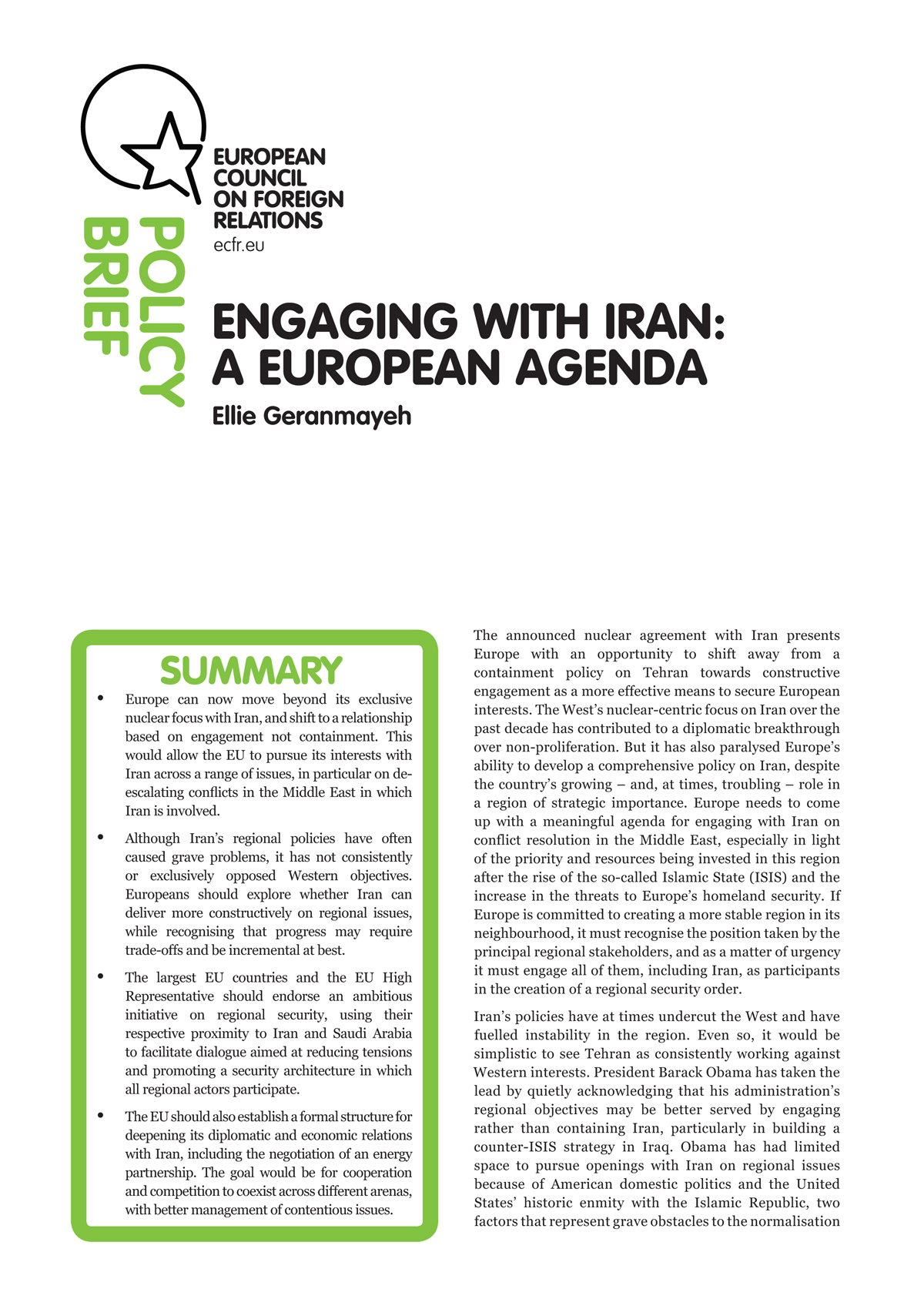Engaging with Iran: A European agenda
Iran deal should be a catalyst to end decade-long stand off with Tehran and lead to engagement on regional security
Europe should use the Joint Comprehensive Plan of Action (JCPOA) announced with Iran as a catalyst to end a decade-long stand off with Tehran and endorse high-level engagement on regional security objectives, according to a new ECFR report.
“Engaging with Iran: a European agenda” highlights Iran’s increasing strategic significance in a conflict riven Middle East. Geranmayeh points that despite years of sanctions, Iranian capabilities and influence in the region has grown in strength – having acknowledged this, Europe should now explore the opening created by the JCPOA to utilise Tehran’s role in ways that are more constructive to European interests.
To move towards engagement, Geranmayeh suggests that Europeans should establish the formal and political structures necessary to deepen and eventually normalise relations with Iran including:
- Intensify regional diplomatic trouble-shooting: Europe should step-up its outreach with regional stakeholders, including Iran, aimed at de-escalation and conflict resolution – on Syria, Yemen, anti-ISIS efforts and more. This should be at a high-level and high-intensity led by the EU High Representative and the E3 member states with significant interests and influence in the region (France and the UK are particularly close to Saudi Arabia with Germany have a relative edge with Iran).
- Revive a platform for EU – Iran engagement: forming a new EU Iran focus group based with the External Action Service, and establishing a permanent mission in Tehran as soon as possible. The EU High Representative should propose to Iran’s Foreign Minister a scoping exercise for a mutually agreed agenda incorporating comprehensive engagement. The Iran focus group should consult with counterparts in Tehran and across member states to develop this agenda.
- Early moves on economic front: once the JCPOA is affirmed, Europe should enter into economic discussions with Iran, including negotiating an EU led memorandum of understanding for an energy partnership with Iran as soon as feasible, and at member state level a privately initiated support-base for Iran’s bid for WTO membership.
- Forward planning exercise on regional security architecture: with counterparts in the US and Russia on how they can contribute towards and support actors in the Middle East in designing a security architecture.
The rewards for engagement could be significant for both sides. Working with, rather than in opposition to Tehran, the EU and its member states will be in a better position to encourage and push de-escalation between Iran and the Saudi-curated ‘Sunni front’. Europe could intensify its coordination with Iran on the anti-ISIS campaign in Iraq and engage more meaningfully over a potential political solution to conflict in Syria. And Iran has influence that could be brought to bear in reducing conflict in Yemen.
The Iranian leadership has recognised that in order to benefit from global economic markets and strengthen its domestic legitimacy, it must reintegrate into the international political stage and remove Iran from a pariah status. While of widening economic ties are unlikely to alter Iran’s more egregious behaviour in the region on their own, the EU could reasonably introduce the expectation that Iran should recalibrate its regional calculations in exchange for such reintegration.
The European Council on Foreign Relations does not take collective positions. ECFR publications only represent the views of their individual authors.



